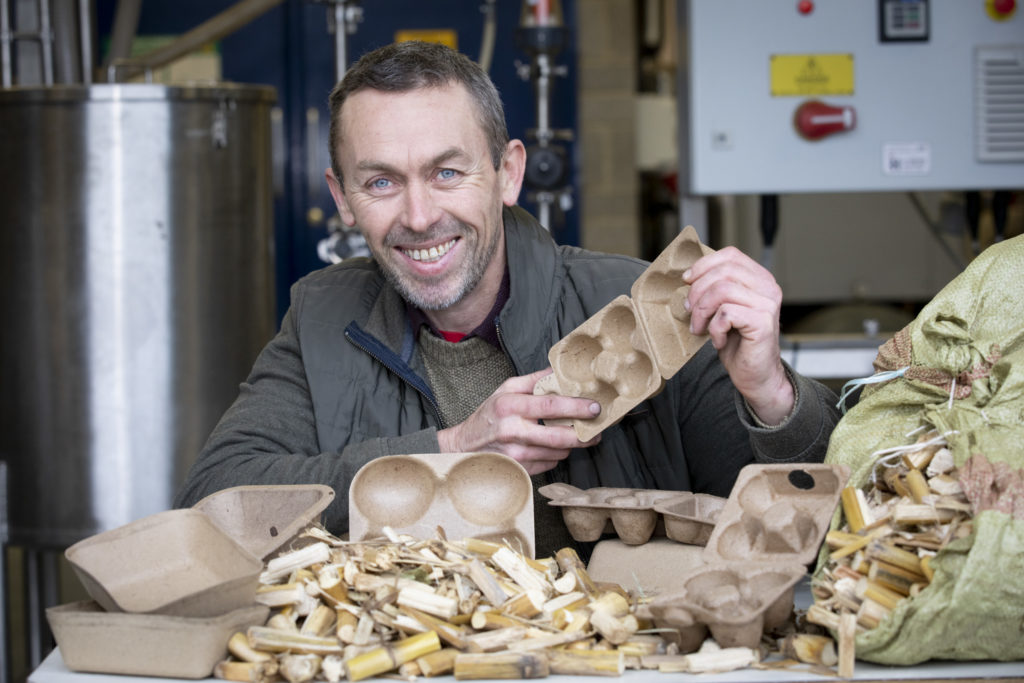
Eco-friendly packaging developed by scientists in North Wales to help women farmers in one of Africa’s poorest countries could soon be on supermarket shelves in the UK.
The team at Bangor University’s BioComposites Centre on Anglesey and partners in Uganda have been using waste from one of the country’s most important cash crops – maize – for the project which could help cut the use of plastics here.
In Uganda using maize stover – the stalks left after harvesting – could reduce catastrophically high levels of waste of up to 60 per cent from fruit and vegetables like tomatoes and help the country’s subsistence farmers, the vast majority of them women.
Dr Adam Charlton is part of the team from Bangor University who are working with Sussex-based Nafici Environmental Research Ltd, experts in converting agricultural wastes into paper pulp, and partners in Uganda including Makerere University.
He said: “Farmers in Uganda commonly transport their harvest to market using a range of packaging including sacks and plastic containers, which does result in produce spoilage of up to 60 per cent for some products, including tomatoes.
“Maize is one of the country’s most important cash crops and 80 per cent of the plant is left over after harvest and is mainly left in the fields, which can cause termite infestation resulting in subsequent crop damage .
“This residual stover is used for animal bedding and fuel but we’ve been working on using it to make biodegradable packaging which we hope will provide the farmers with another source of income through local manufacture.
“We also believe this and packaging made from other crop residues could be used here as an alternative to conventional plastic packaging.”
Dr Charlton spent two weeks in Uganda in 2019 and was due to visit the country again last year but the Covid-19 pandemic caused that trip to be cancelled and the project to be extended by six months.
He now hopes to return to the country this year and in the meantime has been maintaining regular contact with the locally based partners in the project.
Uganda has two million farmers, 1.6 million of them women, and Dr Charlton added: “Our colleagues at Makerere University in Kampala have been going out to visit them and there is huge interest in the project.
“We have made examples of the packaging here and they’re very excited about it and one of the companies we’re working with in Uganda is a community enterprise which makes bags and packaging and they’re keen to be closely involved in commercialising these products’
“We have made examples of the packaging here and they’re very excited about it and one of the companies we’re working with in Uganda which makes bags and other packaging materials will be closely involved in commercialising these products.
“The aim is to set up a commercial factory out there to produce the packaging from maize stover which will be supplied by the farmers.”
The stover will be pulped and moulded into packaging for eggs, tomatoes, and other fruit and vegetables under the brand name Stoverpack™
Bangor University’s BioComposites Centre was set up in 1989 as a self-funded project to research and develop eco-friendly and bio-based alternatives to synthetic materials in manufacturing, industry and agriculture.
Dr Adam Charlton added: “In Uganda and closer to home we are looking at ways of using the waste from food production to make a range of useful products in ways that are commercially viable.
“In this project we are focusing on the waste products of agriculture and the food manufacturing sector to find new and higher value uses for them.
“We are not manufacturers but a research and innovation team taking ideas and helping companies commercialise them.
“There is a real focus now on adding value to agricultural and food processing residues, from material thrown away by consumers in the home to unused residue in fields and on farms.”
A large percentage of leftovers, between a third and a quarter, are not utilised and the BioComposites team are looking at a range of ways of making more use of the waste generated by the food industry but reducing the amount of chemicals and energy used in the production processes.
For more on Bangor University go to https://www.bangor.ac.uk/ and for more information on the BioComposites Centre go to http://bc.bangor.ac.uk/